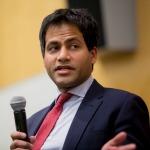Experts and Practitioners Gather at Columbia Law School to Explore Global Privacy in the Digital Age
Academics, Advocates, and Government Officials Debate U.S. and Global Surveillance Policies in Two Events Hosted by the Human Rights Institute and the Roger Hertog Program on Law and National Security
New York, March 20, 2015—Privacy and national security law experts from around the world gathered at Columbia Law School for two events on March 5 to examine U.S. surveillance policy, discuss potential reforms, and analyze how, nearly two years after National Security Agency Edward Snowden’s leaks began, those revelations are shaping global perceptions of privacy around the world.
The conversations were more than theoretical. In one closed session, some members of the group heard directly from Snowden via Skype. Separately, Robert S. Litt, general counsel to the Office of the Director of National Intelligence, offered the U.S. government’s perspective during the first event.
Columbia Law School Professor Sarah H. Cleveland, faculty co-director of the Human Rights Institute, moderated the afternoon discussion, “What Would U.S. Surveillance ‘Reform’ Look Like, and Do We Need It?,” with Litt and ACLU Deputy Legal Director Jameel Jaffer. Much of the session focused on the government’s mass collection of cell phone metadata under Section 215 of the Patriot Act.
| ACLU Deputy Legal Director Jameel Jaffer, left, debated privacy and national security issues with Robert Litt, right, general counsel to the Office of the Director of National Intelligence. Professor Sarah Cleveland moderated the session. |
Litt defended the program and said it is an “insurance policy” to close the gaps that previously existed in the intelligence community. But Jaffer argued—as the ACLU has in litigation—that there is no evidence the surveillance is effective and that in any event it violates the privacy rights of U.S. citizens.
Jaffer and Litt also disagreed about the constitutionality of surveillance conducted by the NSA under Section 702 of the Foreign Intelligence Surveillance Act.
“The implication [of Litt’s argument] is that Americans have no constitutionally protected right of privacy in their international communications,” Jaffer said.
Litt disagreed.
“It’s not that you have no expectation of privacy—it’s how can that reasonable expectation of privacy be overcome?” he said, citing national security concerns. “It’s not no expectation of privacy; it’s a lessened expectation.”
Jaffer did concede that the government has taken steps to be more transparent in the months since the Snowden disclosures, and Litt agreed more such work is necessary to restore the public’s trust in the intelligence community. Still, Litt said some information must remain confidential. He said there was no doubt the Snowden disclosures had damaged U.S. national security efforts.
“If you talk too much about intelligence activities, you lose the ability to do those intelligence activities,” he said.
At the evening panel, “Perceptions of Privacy and Big Brother: Perspectives from Around the World,” the discussion took on a global focus. The panel included Ambassador Antonio de Aguiar Patriota, Permanent Representative of Brazil to the UN; Stefan Heumann, of Stiftung Neue Verantwortung in Germany; Neema Singh Guliani, from the ACLU; Stefánia Kapronczay, of the Hungarian Civil Liberties Union; Carly Nyst, of Privacy International in the U.K.; and Joana Varon, of Antivigilancia in Brazil. The conversation, which examined the impact of the Snowden leaks on the global discussion of privacy and data surveillance, was moderated by Aryeh Neier, president emeritus of Open Society Foundations. The program was introduced by Columbia Law School Professor Sarah Knuckey, faculty co-director of the Human Rights Institute and director of the Human Rights Clinic.
Professor Sarah Knuckey introduced the second event of the day, which featured, from left, Neema Singh Guliani, from the ACLU; Stefánia Kapronczay, of the Hungarian Civil Liberties Union; and Stefan Heumann, of Stiftung Neue Verantwortung in Germany. |
| Aryeh Neier, president emeritus of Open Society Foundations, left, moderated the discussion, which focused on how the Snowden leaks have impacted the global discussion of privacy and national security. The conversation also featured Ambassador Antonio de Aguiar Patriota, Permanent Representative of Brazil to the UN; Joana Varon, of Antivigilancia in Brazil; and Carly Nyst, of Privacy International in the U.K. |
Both events were organized by Columbia Law School’s Human Rights Institute and Roger Hertog Program on Law and National Security, in addition to the ACLU and the International Network of Civil Liberties Organizations. They were part of the institute’s yearlong series on Privacy in the Digital Age.
Watch the discussions, which were streamed live on JustSecurity.org and can be viewed on the Human Rights Institute’s website.
# # #
Founded in 1998 by the late Professor Louis Henkin, the Human Rights Institute serves as the focal point of international human rights education, scholarship practice at Columbia Law School and draws on the law school’s deep human rights tradition to support and influence human rights practice in the United States and throughout the world.










